7 best 1990s crime movies, ranked
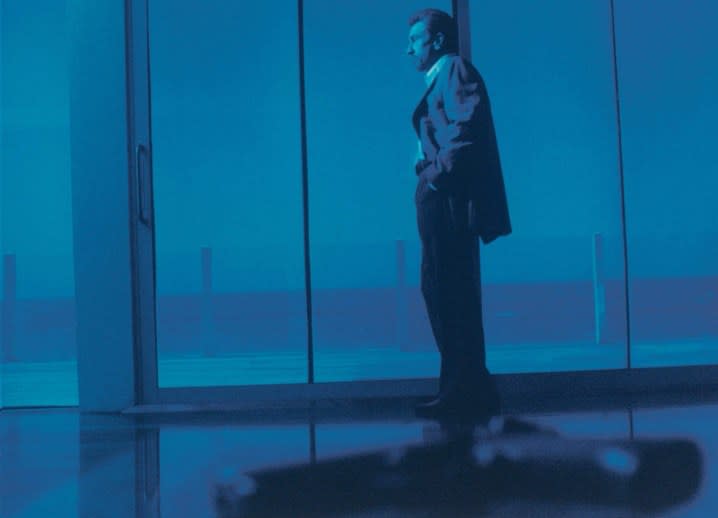
The crime genre has been alive since cinema’s inception. Like most other film genres, crime is at its best when exploring new and different themes, pushing boundaries, and defying conventions and expectations. It’s also great when combined with other genres, especially thriller and drama, although unexpected combinations with romance and sci-fi have also birthed unexpected classics.
Reaching new heights during the New Hollywood wave, it saw a new rebirth during the 1990s, thanks to the rise of independent cinema. Crime movies from the ’90s are gritty, aggressive, sexual, explicit, and refreshingly daring, true subversive works of art that have stood the test of time. Many great crime movies came out during this pivotal decade, but these are among the absolute best, genuine modern gems that perfectly represent the genre.
7. Bound (1996)
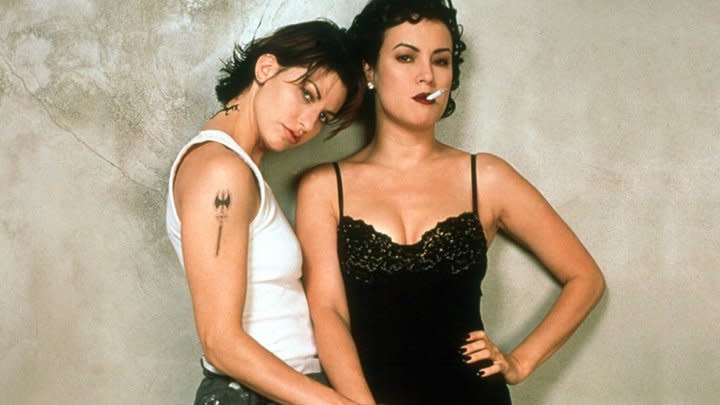
Leave it to the Wachowskis to make a provocative neo-noir crime story that’s as sexy as it is thrilling. Oscar-nominee Jennifer Tilly and Gina Gershon star in 1996’s Bound, which follows Violet, a woman desperate to escape her relationship with the violent criminal Caesar. She then enters a relationship with former con Corky, and the two plot to steal $2 million from Caesar.
Bound is an erotic thriller done right. Gershon and Tilly are explosive together, sharing the kind of chemistry most actors would kill for. The two fit perfectly in the Wachowskis’ gritty and violent world, crafting a new kind of femme fatale that’s both fascinating and alluring.
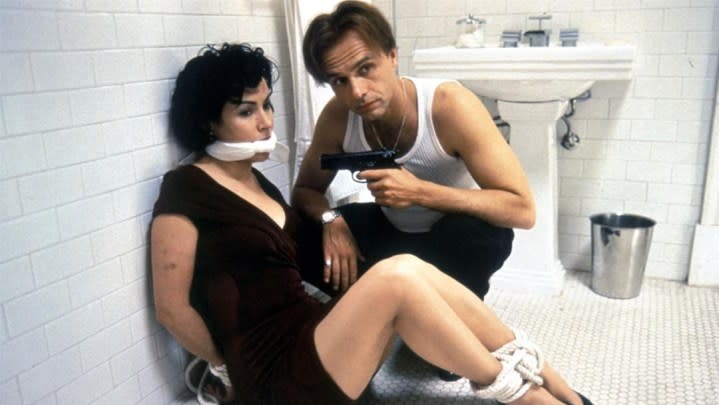
Bound is stylish and riveting, creating a distinctive visual language that separates what could otherwise be a classic noir story. A remarkably daring and refreshing depiction of lesbian love, Bound is sexy, confident, and irresistible, a crime movie unlike any other in the ’90s.
6. The Big Lebowski (1998)
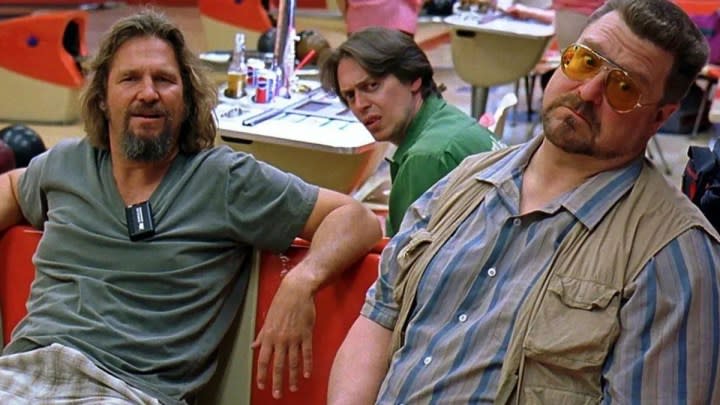
Quite possibly the greatest cult classic from the ’90s, The Big Lebowski has become synonymous with the decade itself. Oscar-winner Jeff Bridges stars as Jeffrey “The Dude” Lebowski, a slacker who gets confused for a millionaire with the same name and assaulted. When the millionaire’s wife is kidnapped, he enlists The Dude to deliver the ransom money, but things get complicated when The Dude’s friend, Walter, plans to keep the money.
The Big Lebowski is among the Coen Brothers’ best movies, featuring their now-iconic idiosyncratic, absurd style in generous doses. The film is deliberately eccentric and surreal, and the performances are perfectly acidic — particularly from the ever-underrated John Goodman — which only heightens the pitch-black comedy.
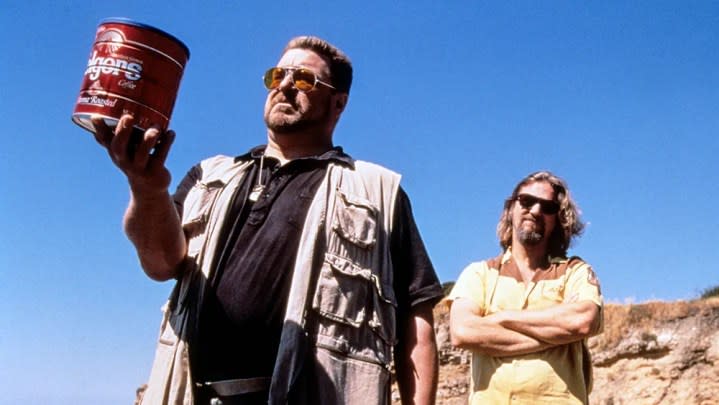
Like most of the Coens’ best movies, The Big Lebowski balances crime themes with laugh-out-loud comedy, resulting in a uniquely disruptive film that ranks among their very best. The Big Lebowski is not only one of the best crime movies out there, it’s one of the best comedies from the ’90s, and its reputation only keeps growing.
5. Fargo (1996)
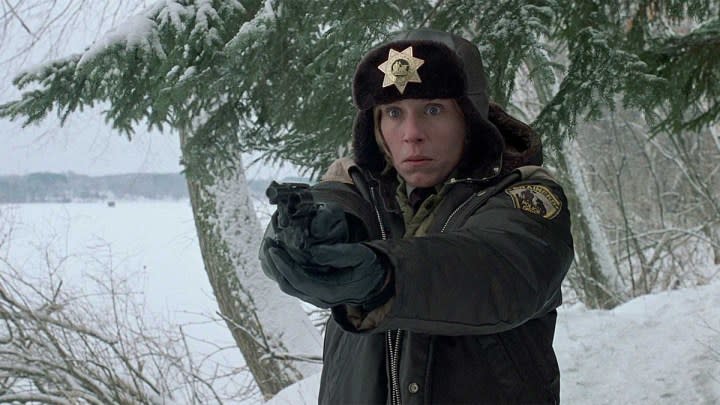
And speaking of the Coen brothers, they truly had a chokehold on the crime genre throughout the ’90s. However, perhaps no movie represents their essence as perfectly as 1996’s Fargo, for which they won the 1997 Oscar for Best Original Screenplay. In her first Oscar-winning performance, Frances McDormand (Women Talking) stars as Marge Gunderson, a pregnant Minnesota police chief investigating a triple homicide. A never-better William H. Macy co-stars as a desperate car salesman who hires two criminals to kidnap his wife so he can collect the ransom from her wealthy father.
Quirky in one moment and ruthlessly violent the next, Fargo is a wickedly clever concoction that could’ve only come from the Coens’ minds. While their previous movies had introduced them as two artists worth watching, Fargo cemented the Coens as once-in-a-generation talents with unique visual and narrative language.
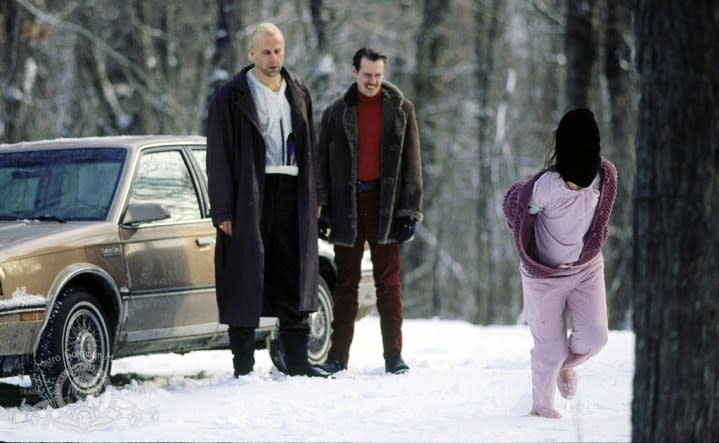
The film was also a significant step forward in the continued rise of independent filmmaking during the decade, a hilarious yet profound crime saga that benefitted from its direct and dark approach to its subject matter. Absurd to the point of being farcical and relentless without becoming bleak, Fargo is a fascinating blend of themes and tones that remains as sharp today as it was in 1996.
Fargo is available to stream on Max.
4. L.A. Confidential (1997)
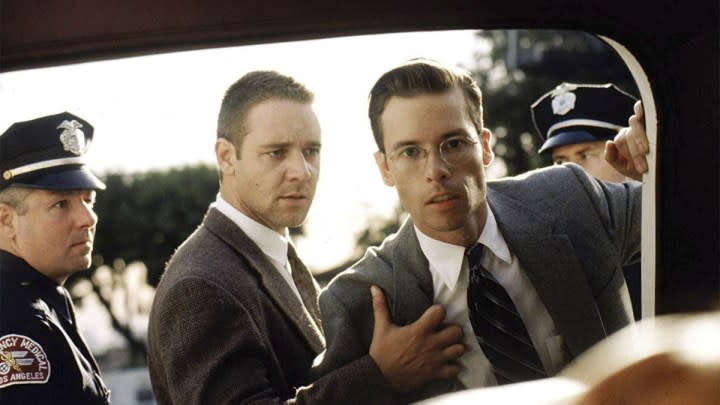
The late Curtis Hanson brought the classic noir style back with impressive force with 1997’s L.A. Confidential. Starring an ensemble cast including Guy Pearce, Russell Crowe, and an Oscar-winning Kim Basinger, and set in 1950s Los Angeles, the film is a study of the links between crime, corruption, and fame. The plot centers on three policemen investigating a shootout at a coffee shop.
L.A. Confidential is a throwback to the golden age of film noir from the 1940s and ’50s, evoking the same visual and narrative style while benefitting from the more overt and ruthless approach of ’90s filmmaking. Hanson crafts an enthralling web of corruption, secrets, and lies that is both seductive and grim, posing intriguing questions about celebrity, impunity, and complicity.
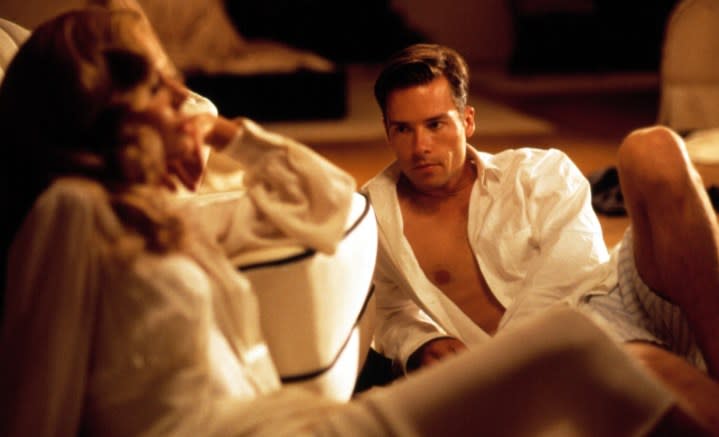
Yet, for all its weighty themes, L.A. Confidential is never anything short of entertaining, remaining an old-fashioned caper that ends with a satisfying send-off into the sunset. In any other year, L.A. Confidential would’ve walked away with the Oscar for Best Picture — however, 1998 saw James Cameron’s epic Titanic on an unstoppable quest to the top.
3. Heat (1995)
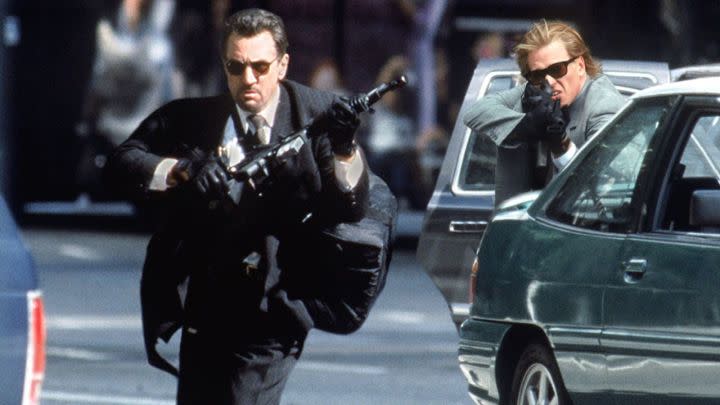
Michael Mann’s greatest triumph is still the 1995 crime drama Heat. Oscar-winners Al Pacino and Robert De Niro star as an LAPD detective and a career criminal entangled in a cat-and-mouse dynamic that comes to define their professional and personal lives. As the two come closer to each other, they develop a feeble understanding despite standing firmly on opposite sides.
Heat stands out from other crime stories in its deeper exploration of the protagonists’ psyches and its remarkably astute insights into the very nature of law and order and its inherent connection with crime. Pacino and De Niro are in fine form, creating a fascinating dynamic between their characters despite sharing mere minutes on screen and imbuing them with personality to spare.
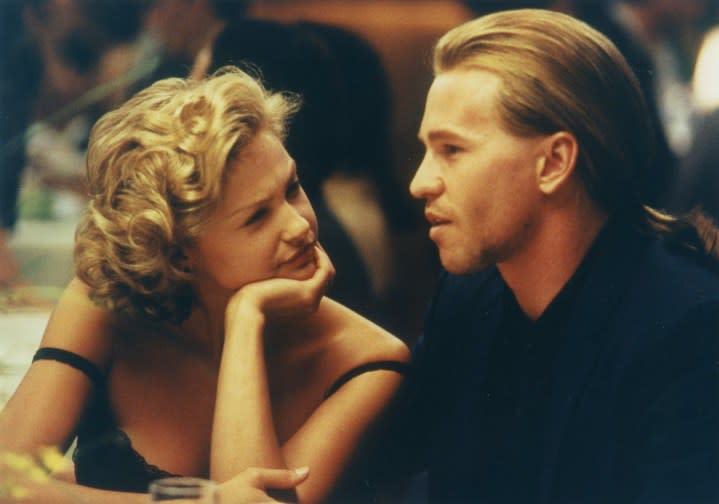
Mann is also at his utter best behind the camera, creating some of the most kinetic and explosive action set pieces in the genre. Heat is violent and unrelenting in nearly every aspect — a sleek, vibrant, and raw take on the crime genre whose in-your-face approach makes it arresting, somber, and utterly unforgettable.
2. Goodfellas (1990)
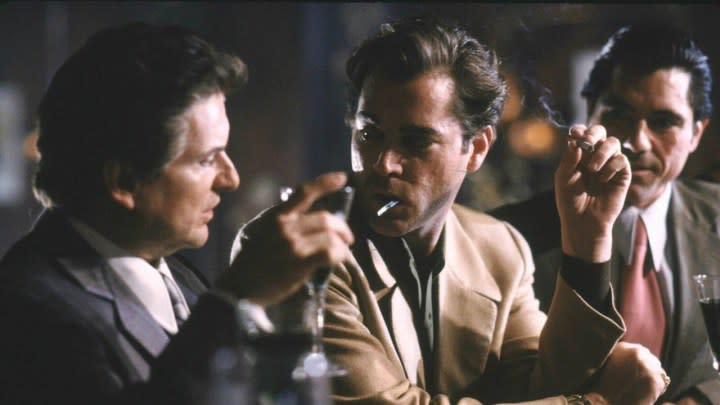
“As far back as I can remember, I always wanted to be a gangster.” Widely considered to be Martin Scorsese’s masterpiece, Goodfellas is an institution within the crime genre. The late Ray Liotta stars as Henry Hill, an ambitious young man who eagerly climbs within the mob’s ranks, leading a life of violence and excess, only for it to come crumbling down.
As visceral and sobering as it is stylish, Goodfellas is nothing short of a masterpiece. Guided by a brilliant Scorsese operating at full creative capacity, the film is big, taking huge swings in every detail, from the camera shots to the narrative choices. Yet they all fall into place, thanks to Scorsese’s determined directing and a truly spectacular acting ensemble that also includes Robert De Niro and Joe Pesci in the role that would earn him the 1991 Best Supporting Actor Oscar.
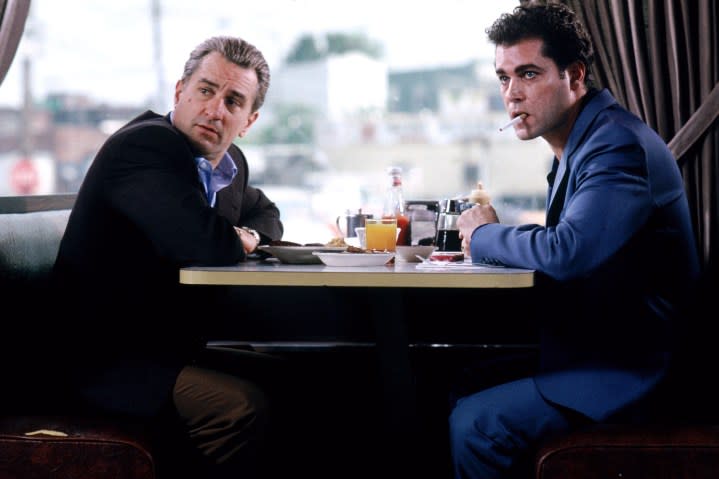
Goodfellas is riveting cinema at its finest, a compelling, ruthless, and electrifying depiction of organized crime that was unlike anything audiences had seen before. The film’s standing has only improved over the years, with many now recognizing it as a before and after in the crime genre, a true disruptive force that inspired pretty much every subsequent depiction of the mafia in movies and TV.
1. Pulp Fiction (1994)
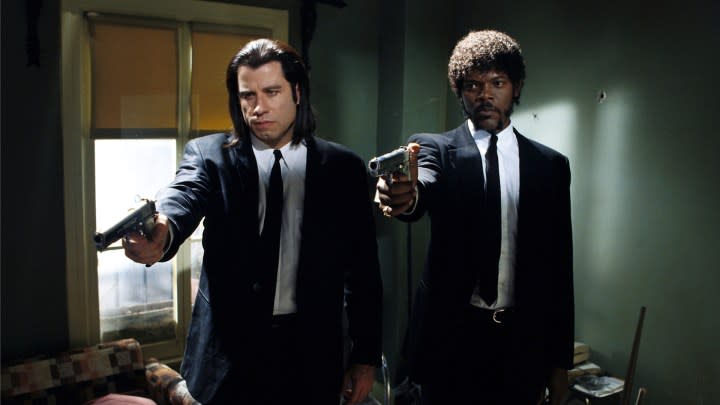
It wouldn’t be an overstatement to call Pulp Fiction the most influential crime movie since The Godfather. Director Quentin Tarantino‘s fast-talking, endlessly quotable, instantly iconic take on the genre stars a massive ensemble cast led by John Travolta, Samuel L. Jackson and Uma Thurman in three Oscar-nominated performances. Structured using vignettes that blend past and present, the film follows several crime stories set in modern-day Los Angeles.
Unconventional and hectic to the point of being overwhelming, Pulp Fiction marked the beginning of a revolution for independent filmmaking. It has come to represent the indie scene from the ’90s, defying every expectation and breaking down walls for future efforts to make the most of modest budgets without sacrificing an ounce of cinematic quality.
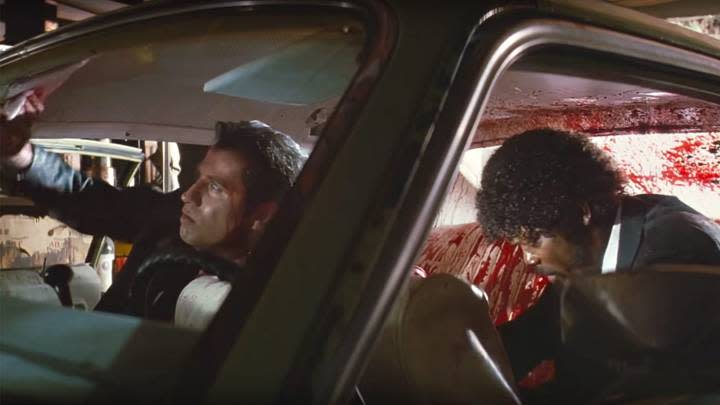
Beyond its influence on the medium, Pulp Fiction is a milestone in pop culture, entering the mainstream lexicon in ways few other films have been able to. Although the crime genre has produced many timeless masterpieces, Pulp Fiction remains a riveting and game-changing crime saga and Quentin Tarantino’s magnum opus. No film better represents the revolutionary nature of ’90s cinema, and its legacy as both a brilliant crime movie and a daring pioneer in filmmaking can only keep increasing.
